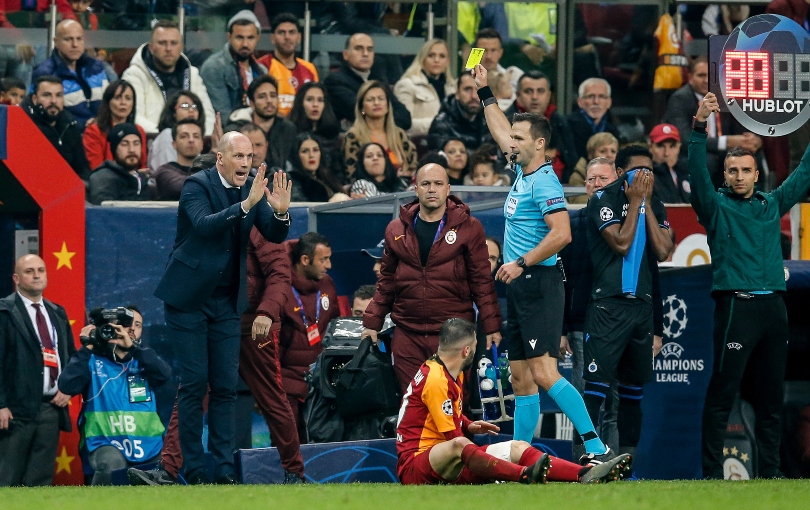Time-wasting really is a scourge on football – here's how to fix it
Scenes in the Champions League this week showed why referees must get to grips with players wasting time

One of the stranger games of the past week took place in Istanbul on Tuesday evening, when Club Brugge snatched a late goal at Galatasaray and, in doing so, likely secured their parachute into the Europa League knockout stages.
The match was different for featuring two red cards in the wake of the visitors’ equaliser, including one for a savage act of a brutality on a corner flag. But it was also unusual for including a long delay in stoppage time as a result and then, in a reverse of the aggravating modern trend, a referee adding those minutes, properly and accurately, on to the end of the game.
Sure, the splintered corner flag may have made for the better photograph, but that was a very welcome sight too. Particularly as, down to ten-men and with the point they needed as a bare minimum, the Brugge players then started collapsing with phantom cramps and taking re-starts at glacial pace.
They deserved their point in the end, they were the better and more adventurous side over the course of the 90(+8) minutes, but it’s easier to concede that having watched them be forced to play their way to the end of the game.

To be clear: from a player’s perspective, time-wasting is most likely an impulse. Modern football is physically exhausting, its rewards are opulent and, when a match creeps towards its end, the temptation to do anything necessary just to get over the line must be overwhelming. Most people understand that. So, while it could be argued that there’s a moral obligation not to waste time, the burden of eradicating it falls upon the game’s officiating bodies.
It will only disappear once it starts being properly policed and, clearly, that isn't the case at the moment.
Here’s an interesting exercise: with the weekend of football approaching, find any game from any league on Saturday and Sunday, and take note of what players are allowed to get away with. With a team in a winning position, pay attention to how long their ‘keeper is allowed to dwell over his goal-kicks, for instance, and how long a simple restart takes after an offside flag or foul.
Get FourFourTwo Newsletter
The best features, fun and footballing quizzes, straight to your inbox every week.
More importantly, notice how blighted most stoppage-time periods are by those shenanigans in general and how often referees, perhaps under pressure from a whistling crowd, fail to compensate the added time accordingly. .
While you're here, why not take advantage of our brilliant subscribers' offer? Get the game's greatest stories and best journalism direct to your door for only £9.50 every quarter. Cheers!
The irony - in this age of complicated protocols, VAR and advanced geometry for offside decisions - is that this should be very easy to fix.
Football is a stop-start sport and, at present, the average ball-in-play time for a Premier League game tends to hover around the 60-minute mark. The nature of that structure makes it easier to separate natural stoppages from artificial delays. So, to anyone with even basic familiarity with the game's mechanics, there’s an accepted rhythm to taking a throw-in or retrieving a ball, and it’s very obvious when a player isn’t conforming to it.
From time to time, remedies are suggested. A stopping clock, for instance, as used in rugby league. It’s a valid argument, even if it presents a few practical issues. But that’s very much Stage Two; it's the nuclear option. Stage One would be much simpler. It actually needn’t be any more complicated than demanding that referees become more vigilant and, where necessary, perhaps even draconian. Punish teams who waste time. Make it to their detriment.
Be realistic about how many seconds are being chiselled away by those ‘cramps’ and, when a substitute takes an age to leave the field, don’t just add the standard 30 seconds, pay attention to how much time it actually takes for play to restart. Maybe there's even room to create a disincentive: if a coach wants to make a change in stoppage-time, for instance, with the sole aim of stealing time away, then there should be a time penalty to pay. Two extra minutes, as standards.
Or if there isn't an appetite for mini-revolution, then possible just some common sense? Perhaps don’t wait until the 80th minute to issue yellow cards for time-wasting. And, if he’s already been cautioned, don’t be afraid to send off a goalkeeper for committing further offences. In fact, the first referee to actually do that should be cast in bronze.
Seriously. Or quite seriously. But it's definitely important, because the impression at the moment is either of a refereeing generation without the courage to make those kind of decisions or one strangely oblivious to the liberties which continue to be taken.
Yes, this grievance may haved strayed into Grumpy Old Man territory a few times and, most likely, the 'Abe Simpson shouting at a cloud' meme is heading towards me from more than one direction. So be it, though, because time-wasting is a challenge to the essence of the sport and anything which enables it is at odds with the very nature of sporting competition.
It isn't being confronted with nearly enough vigour.
NOW READ...
COMMENT Why Arsenal's patience with Unai Emery has to run out sooner rather than later
QUIZ Can you name the top 32 all-time English goalscorers in the Champions League?
GUIDE Premier League live stream best VPN: how to watch every game from anywhere in the world
Seb Stafford-Bloor is a football writer at Tifo Football and member of the Football Writers' Association. He was formerly a regularly columnist for the FourFourTwo website, covering all aspects of the game, including tactical analysis, reaction pieces, longer-term trends and critiquing the increasingly shady business of football's financial side and authorities' decision-making.

